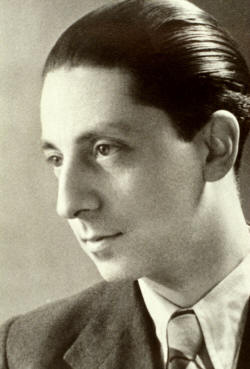

Queer Places:
Via delle Mole Dè Fiorentini, 28, 00186 Roma RM
Cimitero Flaminio
Rome, Città Metropolitana di Roma Capitale, Lazio, Italy
Sandro Penna Municipal Library, Viale S. Sisto, 6156 Perugia PG
 Sandro Penna (June 12, 1906 – January 21, 1977) was an Italian poet. Openly gay,[1] his works were largely marked by his melanchonic view of homosexuality as emargination. Penna's economic conditions were often poor, and in his late years a group of intellectuals signed a manifesto in the newspaper 'Paese Sera [it]' to help him.
For Sandro Penna boyhood was the embodiment of desire and the inspiration for all of his poetry.
Sandro Penna (June 12, 1906 – January 21, 1977) was an Italian poet. Openly gay,[1] his works were largely marked by his melanchonic view of homosexuality as emargination. Penna's economic conditions were often poor, and in his late years a group of intellectuals signed a manifesto in the newspaper 'Paese Sera [it]' to help him.
For Sandro Penna boyhood was the embodiment of desire and the inspiration for all of his poetry.
Penna was born in Perugia, but after the age of sixteen, spent most of his life in Rome. By some standards, his life was uneventful, unambitious, lonely, scruffy, and sordid. One does not have to endorse this view. Penna made firm choices about the two things in life that interested him most: poetry and boys.
He did not live a public life, even if his private life was generally conducted in public places. Furthermore, his poetry never developed beyond its earliest forms and topics; he was content to spend his life perfecting the narrowness of his craft.
Penna's friend, the bisexual poet Umberto Saba, helped him get published. He gradually accumulated a distinguished collection of friends and admirers, including the novelists Elsa Morante and Alberto Moravia.
For several years, he had a competition with Pier Paolo Pasolini to see who could make love with the greater number of boys along the overgrown banks of the Tiber and in the scattered urinals of Rome's ugly urban landscape. It was Pasolini who most consistently championed Penna's poetry.
Boyhood was Penna's inspiration and his topic. In his verse, the figure of the boy is a personification of love. Boyhood itself is Eros demythologized, the embodiment of desire. The words ragazzo and fanciullo become even more resonant than lad had been to homosexual English poets at the turn of the century.
Boys exert a uniquely transformative power not only on the landscapes they inhabit, but also on the lesser mortals with whom they come into contact. Penna identifies with them in their adolescent loneliness, envies their camaraderie, and joins them in erotic solidarity on hot Roman evenings.
Each poem is as fleeting as the encounter it records. Each constitutes a moment of intense feeling, often a concentrated mixture of past loves and present desires. Penna does not write with the intellect but with the focus of emotions that are physically based.
His poetry takes pleasure in pleasure, re-establishing the shock of joy. In a particularly expressive phrase, "L'amore era con me nella mia mano" (literally, "love was with me in my hand"), he articulates both a sense of loss and a crucially ambiguous association of mutual and solitary masturbation.
One poem sums up Penna's attitude to criticism of his thematic narrowness. Responding to the complaint that there are always young men in his poems, the poet replies: "Ma io non so parlare d'altre cose. / Le altre cose son tutte noiose" ("But I don't know how to write about anything else. Everything else is just boring"). If his sexual interest is a limitation, it is one he accepts with cheerful equanimity.
My published books: